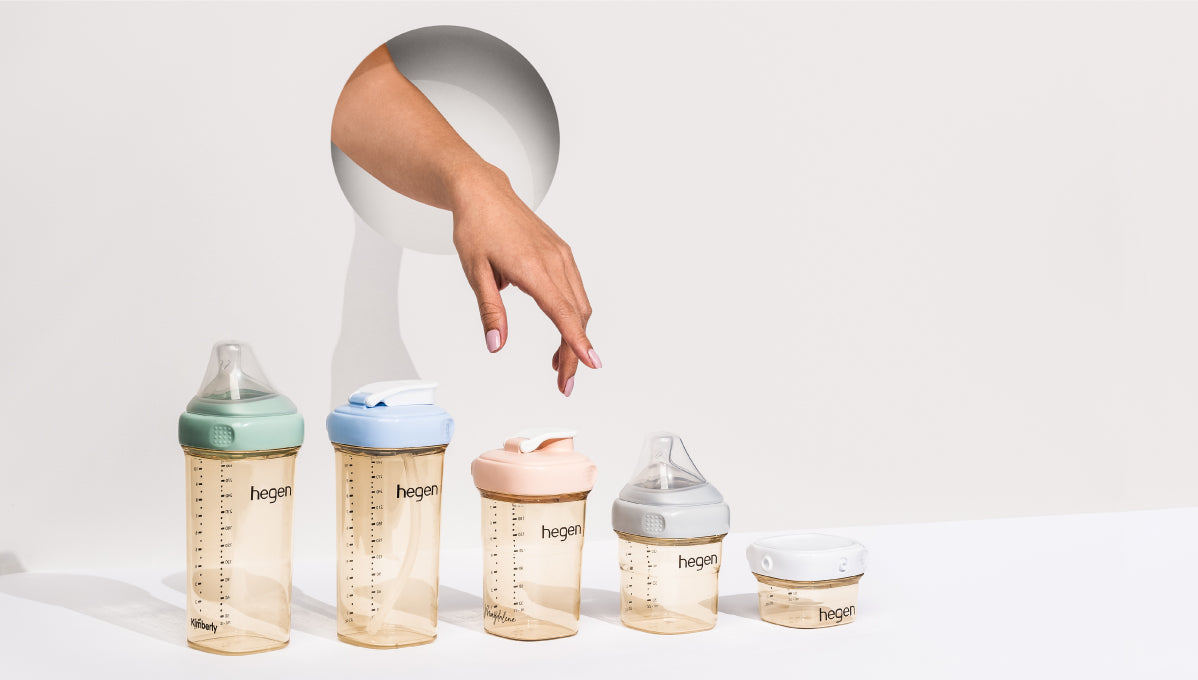Congratulations! You have welcomed your newborn into the world. You might now be wondering what to expect next. Let us bring you through your first week after birthing.
Day 1
In the first hour after childbirth, if the baby is healthy, your birth team will place them on your chest for skin-to-skin contact. Take your time to bond with your baby and enjoy this magical moment. They will instinctively start to root and search for your nipple. Get the help of your lactation consultant to establish a good latch. Your first milk or colostrum is a thick golden liquid (also known as liquid gold to breastfeeding mothers) which will provide your newborn with all the nutrition they need. Your baby should have at least one wet diaper and one bowel movement within 24 hours.
If your baby is not with you and cannot nurse directly, we recommend using the Hegen PCTOTM Manual Pump within the first 6 hours of birth to kickstart breastfeeding. Pump for 10 minutes on each side so your brain will send signals to start milk production. Hand express and collect colostrum for the nurses to feed your baby with a cup or syringe. Knowing what to pack in your hospital bag and having your breast pumps on hand for situations like this is essential.
Day 2-3
You will be feeding your newborn every 2-3 hours. Check-in with your lactation consultant to ensure you have a good latch. Monitor the number of wet and soiled diapers to ensure your child drinks sufficiently.
Using a manual pump allows you to apply the desired pressure on your breasts, easing them into the sensation of pumping. To stimulate more milk production, you can use the Hegen PCTOTM Manual Breast Pump to pump for 10 minutes after each latch. Our flanges are designed to be gentle on your nipples, making it a comfortable pumping experience, especially for new mums. Make sure you measure your nipples to find the correct flange size.
Day 4-5
By day four, your milk supply has probably come in. You would notice that your breasts feel fuller and heavier. Your newborn should also be drinking faster if they have mastered the latch. To prevent engorgement, hand express or pump milk before latching your baby; otherwise, they may be unable to drink from an engorged breast. Apply a warm compress, use the manual pump to clear blocked ducts, and put on an ice pack to ease engorgement and reduce swelling. Seek help from your lactation consultant.
Day 6-7
Once the milk supply is in, you will have a more predictable breastfeeding routine of latching or pumping every 2-3 hours. If you choose to pump, you may introduce an electric breast pump at this point. Hegen PCTOTM Double Electric Breast Pump is gentle on your nipples and allows a seamless transition to manual pumping. Pumping after each latch also stimulates your brain to produce more hormones for milk production.
After the first week
Congratulations on getting through the first week! Continue to latch on-demand or pump frequently in 2-3 hour intervals for the first few weeks to establish your milk supply. It takes about 6-8 weeks for your milk supply to fully develop and for your baby to master the latch properly.
You might experience clogged ducts along the way. Hegen PCTOTM Double Electric Breast Pump has a kneading massage function that is most helpful in releasing tension from breast engorgement. Simply place the kneading ring on the clogged duct and experience the cupping sensation for a few minutes before letting your child latch or use the Hegen PCTOTM Manual Pump to clear the clogged duct. Seek help from a lactation consultant if clogged ducts or engorgement persists.
Conclusion
Breastfeeding is a rewarding experience for most mums but is also one of the more challenging tasks post-labour. Prepare yourself adequately for it by booking a Caring for Newborn class at Hegen Lactation Centre to learn about breastfeeding basics and techniques to care for your newborn.
With our centre’s many preparatory classes and lactation services in Singapore, you can be adequately prepared to give your baby the best care. You will also learn how to manage the possible breastfeeding and pumping issues you may encounter, making your experience more enjoyable. Head to our website today to find out more about our services.





